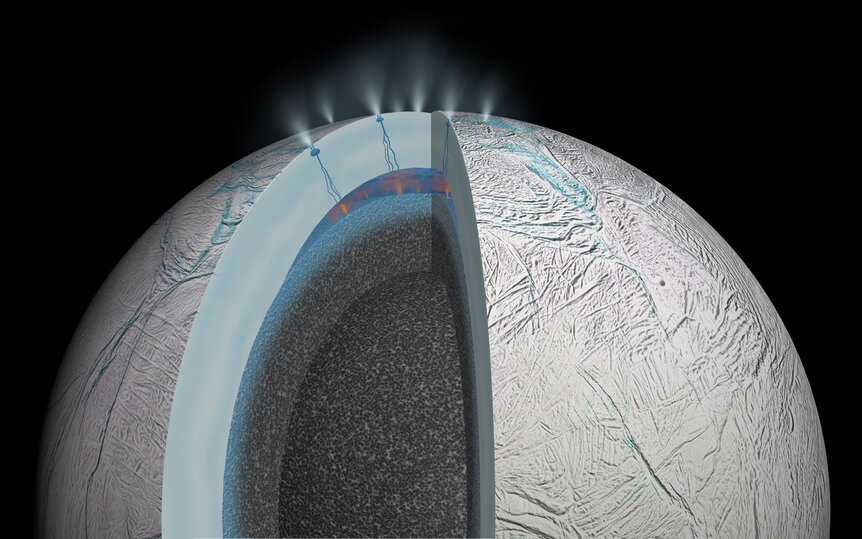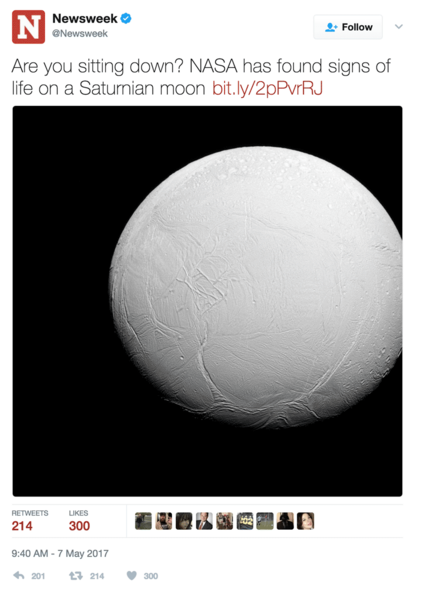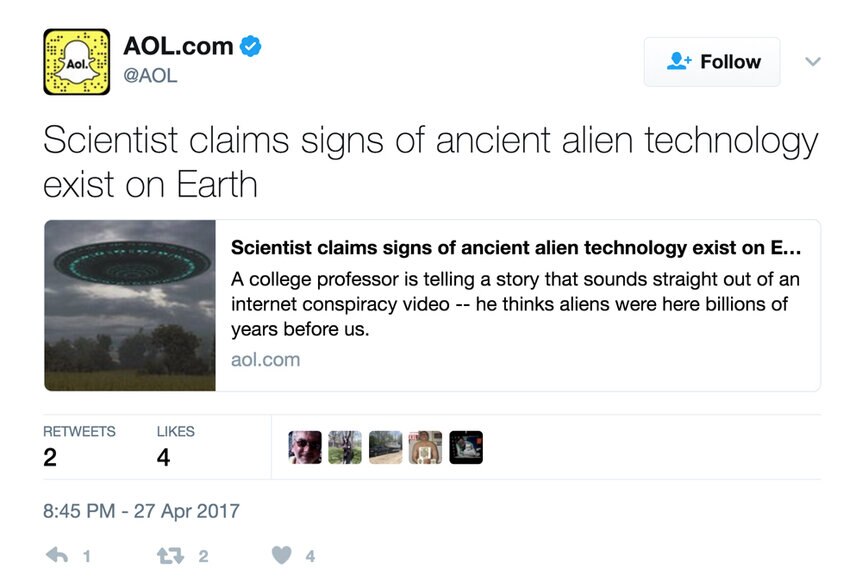Create a free profile to get unlimited access to exclusive videos, sweepstakes, and more!
No, we haven’t found signs of life – alien or otherwise - in the solar system

The past couple of weeks have been pretty irritating if you’re a fan of the scientific and rational approach to looking for life on other planets. A flurry of news outlets —some of which have been otherwise reliable; others, um, not so much — have been reporting on a couple of really interesting results from actual scientists on life in the solar system.
The problem is, the reporting has been really awful. With only a few exceptions, there have been breathless click-baity headlines, bad ledes, and statements made that are simply wrong.
First, let’s talk life not on another planet, but under an alien moon. Specifically, Enceladus, a moon of Saturn. A few years ago, the Cassini spacecraft spotted geysers of water erupting from the south pole of Enceladus, and after a lot of further observations, it appears this indicates an entire ocean of water under the moon’s frozen surface. Although it’s nearly 1.5 billion kilometers from the Sun, the moon is warmed by tidal flexing, a stretching force it feels from Saturn. This is enough to melt the ice under the surface and keep it liquid.
So, could life be there? Arguments have gone on for a while now, but a new observation is very interesting: Cassini detected molecular hydrogen in the water plumes. Hydrogen is an abundant element in the Universe, but it’s highly reactive in the presence of water, so very little would be expected to be found in the plumes. But, there it was.
The leading idea is that it’s from hydrothermal vents under the ocean of Enceladus; nothing else makes as much sense. We see these on Earth, where tectonic activity creates vents on the ocean bottom, and these leak interesting chemicals (and lots of heat) into the water. Life flourishes at these vents here on Earth, so, if they exist on Enceladus, as well, that could support life.
So,putting this together, we have a moon that we know has water, and have found indirect evidence for hydrothermal vent activity. We have not found life, and we have not even found evidence for life. Just that conditions for life, maybe, might be under the surface of Enceladus.
So, what did the magazine Newsweek tweet about this?
That was posted to Twitter on the morning of May 7. I contacted Newsweek on May 8, but never heard back. After quite an uproar from astronomers and others on Twitter, the tweet was removed the afternoon of May 8.
I’m glad they took it down, because that claim was just patently false. The article, itself, is a bit more circumspect, though I think it goes a little too far calling the moon “inhabitable”. That’s a stretch; we simply don’t know that, yet, from these findings. It’s certainly a possibility, and the evidence is very interesting, but the presence of hydrogen in the plumes just isn’t enough information to let us know if conditions under the surface there are good for life. I think the article does a good job laying all this out, and deserves a lot better than a breathless and wholly inaccurate tweet.
To be fair, I generally like Newsweek, and this was probably the work of an overly enthusiastic person in their social media group. And while I’m glad the tweet was removed, it was up for over a day; far too long. Mind you, that Twitter feed for the magazine has 3.3 million followers, so a lot of people saw that nonsense. As of the time I write this, no correction to Twitter was posted, either.
This sort of thing is upsetting because it diminishes real science being done to look for life on other worlds, and it also inures the public to it as well. If and when NASA or some other group makes an important announcement, there’s a “cried wolf” aspect to it when the media get this stuff so basically wrong.
Which brings me to the second bit of (literally) bad news. This too has to do with alien life, but this time, it’s looking for evidence of an advanced, intelligent, technological civilization...that may have existed on Earth or other planets long ago.
Astronomer Jason Wright likes to think outside the box. He was the driving force behind the idea that the strange dips in the brightness of Tabby’s Star could be due to an alien megastructure being built there. Mind you, he never claimed it was, just that it’s an interesting idea and worth taking a look at. I agreed (disclosure: I’ve talked to Jason many times via email and phone, and consider him a colleague).
In this new case, Wright has written a paper asking a very interesting question. We’ve been looking for signs of life on other worlds for a while now, but we’ve been looking for microscopic life (extant or otherwise). What if, instead, an actual civilization arose eons ago and then died out (or left)? How would we know?
I love this idea. I’ve thought of it many times over my whole life, in fact. There are many issues to consider; for example, how long would structures last on their own? How long before geologic activity and erosion would grind them away? Would a civilization leave behind secondary evidence, like say radioactive materials used in manufacturing or power generation that are not naturally generated? Could we detect them via an imbalance in the natural ratios of elements?
And all this is assuming the aliens didn’t mean to leave behind some sort of time capsule message for any new beings that arose millions of years later. A metal or toughened mineral obelisk on the Moon would do nicely, for example.
Again, a fun conjecture, and while it’s low probability (and, as Wright, himself, says on his blog, “There is zero evidence for ancient aliens in the Solar System.”), it's one well worth keeping in mind as we explore other worlds. So, how did the media report on this?
Not well. To be fair, The Atlantic has a good article, and so does Universe Today. You can find others. But if you do look, you’re more likely to find venues that breathlessly overplayed this story, the Daily Mail and AOL. Those all grossly misstated Wright’s work completely, making it sound like he thinks there already is evidence of advanced civilizations.
From AOL: “Scientist claims signs of ancient alien technology exist on Earth."
From Daily Mail: “Professor Jason Wright has written a new paper about an ancient species...He believes the aliens either lived on Earth, Venus or Mars billions of years ago”
Then, there’s this one: “One scientist believes signs of ancient alien technology exist”. The source? USA Today, of all places, which created a video of the story that’s filled with factual errors and exaggerations of Wright’s work. Heck, it opens with the line, “Aliens have been to Earth...and it’s not just the National Enquirer that says so.” That’s ironic, given the hyperbole and inaccuracies in the video. The next thing it says is Wright, “...thinks aliens were here billions of years before humans,” which, again is completely untrue. Wright is interested in looking for any evidence that might exist; he doesn’t think we already have it.
This kind of stuff makes me pretty unhappy. It’s not just that they’re blatantly wrong, though that’s a huge issue, especially when they seem to go out of their way to get obviously basic facts wrong.
It’s that, like the problem with Newsweek’s tweet, the more insidious issue here is the erosion of the public trust in science. There’s the “boy who cried wolf” part I mentioned earlier, but there’s also the problem that by playing up the X-Files aspect of this, it makes science and scientists look silly. And it’s based on bad reporting.
I know Jason well enough to state with confidence that his science is tight. He knows his stuff, and while he may enjoy playing around the edges of ideas, he does so with credibility and with the backing of experience and intelligence. This mischaracterization of his ideas and of him is, frankly, appalling.
This isn’t my first rodeo; I’ve spent hundreds of hours and tens of thousands of words debunking bad news stories about science. I know this will always be a problem.
But in a time when the government cries “fake news” every time a story is published that goes against them, I think it’s more important than ever to have our critical thinking caps on when we read the news. Question the venue, question the accuracy, find original sources (like Wright’s paper), see if the person his- or herself,was actually quoted.
And when it comes to astronomy and space science, check Twitter. Seriously, a lot of us are there, and when a story like these come along, we’ll be pretty vocal about it. None of us likes it when our life’s passion is besmirched, and we’re a passionate group.
Image Credit: Shutterstock / Rashevskyi Viacheslav





























